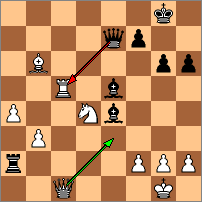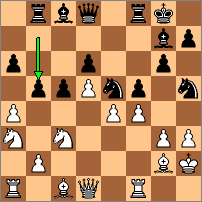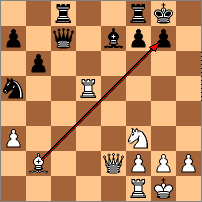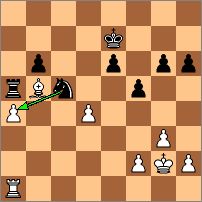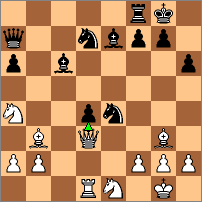| Year | Description and implications | Result |
| 1981-Feb | Match-Tournament of USSR Teams, Moscow (board
1)
Implications and Drama There was pressure for Lev Psakhis to play on board 1 despite Kasparov having a much higher rating. A possible explanation was that Karpov who was board 1 for another team, did not want to face Kasparov, and used his influence accordingly. Kasparov had two exciting draws with Karpov |
1st (+3=2-1) |
| 1981-Apr | Moscow, Category 15
|
2nd (+3=9-1) equal with Polgayevsky and Smyslov after Karpov |
| 1981-May | USSR Team Championship (1st League), Moscow (board 1) | |
| 1981-Aug | World Junior Team Championship held in Graz, Austria | Soviet team won
Kasparov's individual performance was (+8=2) |
| 1981-Oct | Grandmaster tournament, Tilburg
Implications and Drama This tournament was an important lesson for Kasparov in how resourceful Grandmasters can be |
6th-8th position (+3=5-3) |
| 1981-Dec | USSR Championships, Frunze 1981
Implications and Drama Dramatic last round win against Tukmakov, needed to win the tournament
Tukmakov made the horrific blunder Qe3 here, allowing Kasparov to play Qxc5 exploiting white's back rank
|
1st equal with Psakhis (+6=7) to be titled joint USSR champion |
| 1982-May | Grandmaster tournament, Bugojno
Drama and implications The drama was in being able to play in this tournament in the first place. Since the wounding by Fischer of Soviet chess system, the authorities were keen to ensure that Karpov would be dominant as their national chess flag for quite some time. As such they did not really need another champion. Kasparov was denied by the officials at first the right to play in Bugojno, and was offered instead the low category tournament at Dortmund
The sling was in the form of a ten minute speech which was in effect a coded message to Geidar Aliev asking for support for Kasparov's experience abroad. Surprise, surprise, Karpov was not at this tournament |
1st (+6=7-0) |
| 1982-Sep | Moscow Interzonal - the major event of the
year Implications He became a candidate |
1st (+7=6-0) |
| 1982-Nov | 25th World Olympiad held in Malta, Lucerne
(board 2 behind Karpov)
Implications and drama Kasparov was again the highest scorer on the team. Kasparov had the opportunity to play the great Kortchnoi (who Karpov was arguably afraid to play without the backing of an army of grandmasters), and left a knight en-prise for 7 moves:-
Kortchnoi,V - Kasparov,G [ECO code: A64] Lucerne Lucerne (10), 1982 1.d4 Nf6 2.c4 g6 3.g3 Bg7 4.Bg2 c5 5.d5 d6 6.Nc3 0–0 7.Nf3 e6 8.0–0 exd5 9.cxd5 a6 10.a4 Re8 11.Nd2 Nbd7 12.h3 Rb8 13.Nc4 Ne5 14.Na3 Nh5 15.e4 Rf8 16.Kh2 f5 17.f4 b5 18.axb5 axb5 19.Naxb5 fxe4 20.Bxe4 Bd7 21.Qe2 Qb6 22.Na3 Rbe8 23.Bd2 Qxb2 24.fxe5 Bxe5 25.Nc4 Nxg3 26.Rxf8+ Rxf8 27.Qe1 Nxe4+ 28.Kg2 Qc2 29.Nxe5 Rf2+ 30.Qxf2 Nxf2 31.Ra2 Qf5 32.Nxd7 Nd3 33.Bh6 Qxd7 34.Ra8+ Kf7 35.Rh8 Kf6 36.Kf3 Qxh3+ 0–1 |
1st (+6=5-0) |
| 1983-Feb | Defeated Belyavsky (FIDE 2620) in the candidates quarter-final. Kasparov was FIDE 2675 | Won (+4=4-1) |
| 1983 | Grandmaster tournament, Niksic, Category 14
Drama and implications The USSR sports committee awarded Kasparov a special prize for his game against Portisch, "the supreme creative achievement of 1983'
(422) Kasparov,G - Portisch,L [E12] Niksic Niksic (4), 1983 1.d4 Nf6 2.c4 e6 3.Nf3 b6 4.Nc3 Bb7 5.a3 d5 6.cxd5 Nxd5 7.e3 Nxc3 8.bxc3 Be7 9.Bb5+ c6 10.Bd3 c5 11.0–0 Nc6 12.Bb2 Rc8 13.Qe2 0–0 14.Rad1 Qc7 15.c4 cxd4 16.exd4 Na5 17.d5 exd5 18.cxd5 Bxd5 19.Bxh7+ Kxh7 20.Rxd5 Kg8 21.Bxg7 (diagram above) Kxg7 22.Ne5 Rfd8 23.Qg4+ Kf8 24.Qf5 f6 25.Nd7+ Rxd7 26.Rxd7 Qc5 27.Qh7 Rc7 28.Qh8+ Kf7 29.Rd3 Nc4 30.Rfd1 Ne5 31.Qh7+ Ke6 32.Qg8+ Kf5 33.g4+ Kf4 34.Rd4+ Kf3 35.Qb3+ 1–0 |
1st (+9=4-1) |
| 1983-Aug | Default against Kortchnoi in Pasadena | |
| 1983 | Awarded first chess "Oscar", awarded by the International Association of Chess Journalists sponsored by the Spanish store El Cortes Ingles. The Oscar is given for merit, strength and news-worthiness against fellow grandmasters. Kasparov obtained 1021 votes against 943 for Karpov | |
| 1983-Nov | Defeated
Kortchnoi (FIDE 2635) in the candidates semi-final (in London)
Drama and implications In respect of the strength of Kortchnoi:-
(419) Kasparov,G - Kortchnoi,V [E12] London, 1983 1.d4 Nf6 2.c4 e6 3.Nf3 b6 4.Nc3 Bb7 5.a3 d5 6.cxd5 Nxd5 7.e3 g6 8.Bb5+ c6 9.Bd3 Bg7 10.e4 Nxc3 11.bxc3 c5 12.Bg5 Qd6 13.e5 Qd7 14.dxc5 0–0 15.cxb6 axb6 16.0–0 Qc7 17.Bb5 Bxe5 18.Bh6 Bg7 19.Bxg7 Kxg7 20.Qd4+ Kg8 21.Ng5 h6 22.Ne4 Bxe4 23.Qxe4 Na6 24.Qe3 Qc5 25.Qxc5 Nxc5 26.Rfb1 Rfd8 27.Bf1 Rd6 28.Rb4 Kf8 29.a4 Ra5 30.g3 Ke7 31.Kg2 f5 32.Bb5 Rd2 33.Rd4 Rxd4 34.cxd4 Nxa4 (diagram) 35.Rxa4 Rxb5 36.Ra7+ Kd6 37.Rh7 h5 38.Rg7 Rd5 39.Rxg6 b5 40.Kf3 b4 41.Ke3 b3 42.Kd2 Rxd4+ 43.Kc3 b2 44.Kb3 Rd2 45.Kc3 Rxf2 46.h4 f4 47.Rg5 Rf3+ 48.Kd4 Rxg3 49.Rxh5 Re3 50.Rh6 Ke7 51.h5 e5+ 52.Kd5 f3 0–1 The match was made dramatic by the fact that Kasparov had defaulted against Kortchnoi in August!
British players might particularly like this rabbit quote!:-
|
Won (+4=6-1) |
| 1984-Mar | Smyslov semi-final Defeated Smyslov to become challenger Implications Kasparov was still only 21 years old and was already the rightful challenger to Karpov! |
Won (+4=9) |
| 1984-Jun | USSR-Rest of the World at London's docklands (board 2) | Russia came first. Kasparov scored (+1=3-0) |
| 1984 | 10 board simul, 5 against British opponents physically present, the others by satellite television link | (+7=3) |
| 1984/10/10 | K-K episode 1, (the one where Kasparov was
5-nil down in a first to 6 match, and Campomanes
stepped in when Kasparov clawed back to 5-3) First Karpov World championship match Location: Hall of Columns in Moscow This match started on 10th September 1984. It was still in progress five months later!. After the 1st nine games, Kasparov found himself with four losses and five draws Kasparov switched style completely, resulting in 17 consecutive draws ! Kasparov did not want to lose through over aggression, and Karpov seemed content to have altered Kasparov's style After six weeks of tedium, Karpov took the lead 5-0 with a beautifully subtle win in game 27. Kasparov stuck to his new style however. In game 31, Karpov was a pawn up in the following position after playing Qxd4:-
However Kasparov managed to obtain a draw
Kasparov was finally rewarded with his first win in game 32, which was notable also for the number of moves made before the kings moved:- Kasparov,G - Karpov,A [E12] Moscow (32), 1984 1.d4 Nf6 2.c4 e6 3.Nf3 b6 4.Nc3 Bb7 5.a3 d5 6.cxd5 Nxd5 7.Qc2 Nd7 8.Nxd5 exd5 9.Bg5 f6 10.Bf4 c5 11.g3 g6 12.h4 Qe7 13.Bg2 Bg7 14.h5 f5 15.Qd2 Bf6 16.Rc1 Rc8 17.Rc3 Rc6 18.Re3 Re6 19.Rxe6 Qxe6 20.Ng5 Qe7 21.dxc5 Nxc5 22.hxg6 d4 23.g7 Bxg7 24.Bxb7 Qxb7 25.f3 Qd5 26.Rxh7 Rxh7 27.Nxh7 Qb3 28.Bd6 Ne6 29.Ng5 Bh6 30.Bf4 Bxg5 31.Bxg5 Nxg5 32.Qxg5 Qxb2 33.Qxf5 Qc1+ 34.Kf2 Qe3+ 35.Kf1 Qc1+ 36.Kg2 Qxa3 37.Qh5+ Kd7 38.Qg4+ Kc6 39.Qxd4 b5 40.g4 b4 1–0 After another 14 draws, Kasparov won two games in a row (games 47, and 48) After 48 games, the score was now 5-3 to Karpov, but suddenly after five months, the match had become alive. Then the unthinkable happened:- The president of FIDE, Florencio Campomanes, flew to Moscow, announcing a postponement of the next game, held meetings with Russian organizers, then declared the match to be terminated without result. British Grandmaster Raymond Keene wrote:-
Kasparov was angry at the decision of the president of FIDE to say the least, believing the entire thing to be a conspiracy between Campomanes and Karpov to save the champion from a severe attack of exhaustion. Later it emerged that Karpov was equally surprised by the decision, and also as annoyed as Kasparov. Mitigating circumstances for the decision were:-
Because of the excessive duration of this match, future matches would take the format of the best of 24 games, instead of the first to score 6 points |
Match suspended(!) (+3=40-5) |
